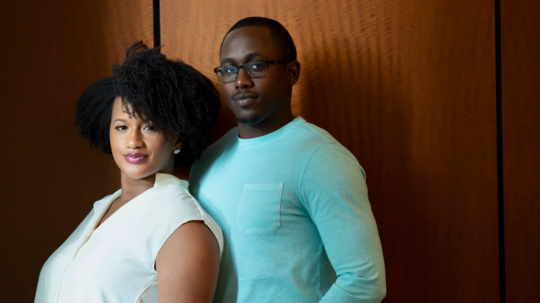
When the workday began on Monday, June 1, the world felt completely different to most.
Chicago and several cities around the country had just experienced a weekend of protests following the death of George Floyd, who died while in police custody in Minneapolis, becoming the latest example of police brutality that disproportionately affects Black and Brown people.
With the coronavirus still ongoing, the country had yet another crisis to face, and the turmoil was weighing heavy on Feyi Olopade Ayodele, the founder and CEO of Chicago startup CancerIQ.
“As a Black founder, it’s actually been a lot harder to even find the words or quickly put out a statement about what we’re doing to respond to this,” Ayodele said. “I’m a Black founder but I’m also a Black [person], who has felt really hurt by everything that’s going on in the world.”
Amid the death of Floyd, Breonna Taylor and other unarmed Black people at the hands of police, there is a reignited conversation flowing through America around systemic racism and social injustice, and how it bleeds into every fiber of America, including the workplace.
The technology industry has long battled a reputation for its lack of diversity and inclusion, and Chicago’s tech ecosystem is no different. The exclusion of diverse founders impacts a variety of the tech industry’s subsectors, but the one area where disparities are the most glaring stem from the funding cycles and habits of institutional venture capital firms.
In the Windy City, hundreds of tech companies raise venture capital every year. Chicago startups raised a total of $2.2 billion in VC funding last year, but of that financing, very little went to Black founders, which already account for only 2% of all Chicago founders, according to a 2017 report from Black Tech Mecca, the most recent available data.
![011019_Feyi Olopade Ayodele Professional Headshot[1] copy](https://media.bizj.us//view/img/11824471/011019-feyi-olopade-ayodele-professional-headshot1-copy*540.jpg)
Inno reporting earlier this month found that Chicago has just nine Black-founded startups that have raised more than $1 million in funding over the course of their startups’ lifecycles.
According to available data, Ayodele’s CancerIQ is one of Chicago’s most-funded, Black-founded startups, with $8.6 million in capital. But raising that funding wasn’t easy, she said.
“Investors naturally invest based on pattern recognition,” Ayodele said. “And one data point that’s missing from that pattern is a pattern of Black women being successful CEOs and leaders of venture-backed companies. As a Black woman, I realized I was already going to be behind.”
CancerIQ, which Ayodele founded in 2013 while working at the University of Chicago, makes a software for healthcare providers that allows them to identify patients who have a genetic predisposition to certain cancers. Prior to launching her company, Ayodele earned an MBA from the University of Pennsylvania’s Wharton School of Business.
Early on in CancerIQ’s journey, Ayodele was advised to bring on a White co-founder to help appease any racist anxieties investors may have, she said.
“My fundraising strategy was all around trying to make sure that I was checking the box on all these things that investors care about, and really outdoing and over-performing in other areas where they might see the management team or founder being weak,” Ayodele said. “We were really focused on making sure that we had proof points that this was a good investment regardless of the founder.”
That mindset meant that CancerIQ needed solid revenue traction and a product-market fit before Ayodele even approached investors. She said she had prototyped her product, sold it and had five-figure checks from clients before a VC believed CancerIQ was a good investment.
“I had to take those checks around to investors and say, ‘Hey, people are willing to pay me,’” Ayodele said. “When it came to raising institutional capital, this is where I personally faced the most friction and I believe it was friction that would not have existed if I were a White male.”
Eventually, she was able to raise money from investors like Impact Engine, 1776 Ventures, Rock Health and HealthX Ventures. Now, CancerIQ has 65 health system clients, a team of 26 employees, and still has room to grow.
“We have a big vision for CancerIQ and it’s going to require more funding,” Ayodele said. “If everyone truly is changing because of these most recent events, hopefully I won’t have friction and can raise a very substantial Series B round in the next 12 to 18 months.”
Ayodele’s story is not unique to her. Inno interviewed several local Black founders and tech leaders, who each said they feel they are treated differently than their White counterparts in the tech and investing industries, whether they’re being underestimated, unfairly challenged or completely dismissed.
Following Floyd's death and the subsequent protests across the country, some U.S. venture capital firms announced plans to directly invest in more diverse founders.
SoftBank announced that it is creating a $100 million fund to only invest in companies led by founders of color. And Andreessen Horowitz launched a $2.2 million Talent x Opportunity Fund, which is designed to invest in Black and Brown entrepreneurs.
Closer to home in the Midwest, Cincinnati-based Lightship Capital announced that it is launching a $50 million fund to support startups led by people of color, the LGBTQ+ community and people with disabilities.
Many Chicago VC firms have issued statements denouncing racism, but little has yet to be done locally in terms of money-backed plans to address investing inequities across race.
Before Floyd’s death, Chicago Blend, a VC-led organization aiming to diversify the local tech scene, was connecting minority and women-led startups with resources to help navigate business challenges caused by the coronavirus.
"As a Black woman, I realized I was already going to be behind."
“We want to invest in founders and companies that maybe have been overlooked,” said Lindsay Knight, the co-founder of Chicago Blend and the director of platform at Chicago Ventures. “They’re out there. You just have to look for them.”
Most investors find founders through their networks. But when investing partners at Chicago’s venture capital firms are 82% White and 87% male, according to Chicago Blend data, the pattern of investing in other White men is difficult to disrupt.
“I want to make sure the pipeline is diverse,” said Jonathan Ellis, the founder and managing director of Sandalphon Capital. “Because you only invest in what you see, and if I’m not seeing many founders of color, I’m not investing in any founders of color.”
Of Sandalphon’s 24 portfolio companies, one is founded by a Black person, Ellis said. He also shared that information on Twitter and encouraged other firms to do the same.
“I published the diversity stats because people said to publish it and hold yourself accountable,” Ellis said. “But not many people have because they are uncomfortable. If we can at least talk about it and acknowledge the issues, then you can start to address them.”
Some venture capital firms have launched with diversity as their primary mission. Harlem Capital, a New York-based VC firm known for investing in diverse founders, has invested in 20 companies so far, and recently backed Chicago AI startup 4Degrees, which is led by former Pritzker Group Venture Capital investor Ablorde Ashigbi.
Ashigbi said that oftentimes getting Black entrepreneurs and VCs into the same room is part of the problem, but that investors need to do more to seek out and invest in entrepreneurs of color. Based on Ashigbi’s investing experience, vetting Black and Brown entrepreneurs was just part of the job.
“In some ways, I think it is harder to not do it,” Ashigbi said. “And that perpetuates a world in which you’re not going to see a lot of Black entrepreneurs.”
Like Harlem Capital, Chicago VC firm Chingona Ventures has also launched with diversity as an essential part of its investing ethos. Samara Hernandez, Chingona’s founder and a former investor at local VC firm MATH Venture Partners, recently revealed the demographics of the founders and CEOs in her portfolio on Twitter, showing that most of the founders in her portfolio, or 39%, are Black. Thirty four percent are Latinx, 20% are White and 7% are Asian.

“If you really want to change, particularly in venture and in tech, there’s actual things that you can do,” Hernandez said. “If people say there’s a deal flow problem, I say come talk to me and many others. There’s plenty of founders that need access to capital.”
Chingona cuts checks ranging from $100,000 to $250,000, and though it doesn’t exclusively invest in non-White entrepreneurs, Hernandez said she deliberately tries to ensure she is considering diverse founders.
“There’s an underlying message that investing in Black and Brown founders won’t make you money,” Hernandez said. “But my goal is to prove that there are businesses being overlooked in the market that can make returns.”
Over the last three years, Chicago curly hair product startup CurlMix has seen its net revenue grow from $100,000 to $5.5 million in 2019. Even despite this year’s pandemic and economic downturn, founders Kim and Tim Lewis expect CurlMix to make comparable revenue to last year.
The startup, founded in 2013, appeared on an episode of Shark Tank last year. The founders turned down the deal they were offered on the show, but the episode sparked a fundraising journey for the company as they felt they were now an attractive investment to VCs, CEO Kim Lewis said.
But despite CurlMix’s early success, fundraising wasn’t an easy task. Lewis said she felt undervalued at times during the fundraising process and that investors gave her low offers because they either didn’t understand her product or underestimated her potential to run and grow a successful business.
By the time the founders even approached institutional investors, CurlMix's revenue topped $1 million, Lewis said, a milestone she thought would make the process easier.

“That’s the thing about being a Black female founder—you’re not going to get money for your ideas,” she said. “We already have to be making money to get money.”
Eventually, Lewis found the right investors, raising $1.2 million. They include high-profile angel investors like Backstage Capital founder and Managing Partner Arlan Hamilton and Jeffrey Weiner, the former CEO and now executive chairman of LinkedIn. Sonia Nagar, a partner at Pritzker Group Venture Capital, also invested in CurlMix.
Most of these investments have not been advertised, giving Lewis the impression investors were doing it for the right reasons and not “for the press,” she says.
“A lot of companies are coming out now like we want to invest in Black founders, but it’s because of the press," Lewis said. “It’s not your mission. It’s not what you personally care about.”
The path forward for building a more equitable startup investing industry entails getting uncomfortable, said Neal Sáles-Griffin, the managing director of Techstars Chicago, an accelerator program that invests $120,000 into each company that’s accepted into the program.
Sáles-Griffin, who was a startup founder and investor before landing at Techstars, said addressing problems of systemic racism in tech and investing require genuine commitments to diversifying portfolios. Like Sandalphon Capital and Chingona Ventures, Sáles-Griffin said he would like to see more firms be transparent about their portfolio demographics, even if it’s embarrassing. He also wants to see more diversity among the investors themselves.
Over the last couple years, there has been some progress among the racial demographics of Chicago's investment community. Chicago Blend data shows that of all the partners from 93 VC firms with a Chicago Office, 5% are Black, compared with 3% in 2018, and 3% are Latinx, compared with 0% in 2018. However, female investing partners saw a decline, with only 13% in 2020, compared to 14% in 2018.

“Until we have more diverse faces and people of color and women involved at all levels of the investment process, we are not going to hit our desired outcomes when it comes to diversity and inclusion,” Sáles-Griffin said. “We can give lip service all day about the initiatives, and the offers for mentorship and office hours, and taking more meetings with Black founders. But until you as a 60-year-old White man are sitting next to people who make you a little uncomfortable because of their perspectives and experiences being so vastly different from yours … you’re not going to have the best investments."
At Techstars, Sáles-Griffin has utilized his leadership role to mentor diverse founders in Chicago, and promote inclusion and diversity throughout Techstars’ network of nearly 50 programs around the world.
Shortly after Floyd’s death, Sáles-Griffin spoke to the entire Techstars staff in a video address, explaining his experience in the U.S. as a Black person and what the program can do to break down barriers for people of color.
“We need allies. We need people who will go beyond just offering up their time,” Sáles-Griffin said. “It is unbecoming of the spirit of entrepreneurship not to challenge yourself to get creative, thoughtful and innovative on how you can be more inclusive. You haven’t done all of what you could do to make this more inclusive and more diverse.
“You have to acknowledge that you fucked up,” Sáles-Griffin continued. “You’ll have better investment outcomes for it in the long run, and you can take that to the bank.”








